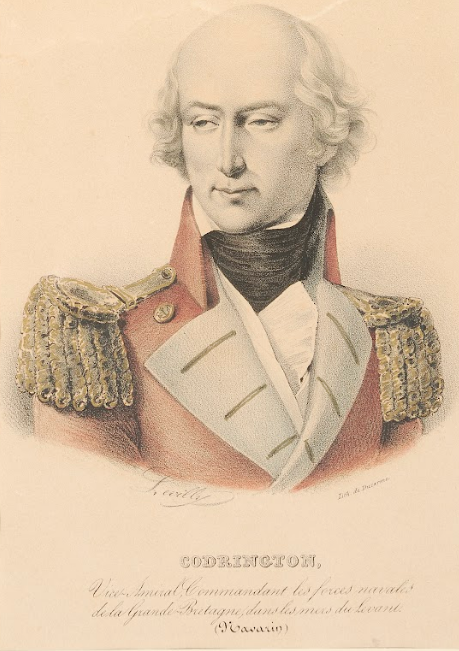Edward Codrington ( 1770-1851 )

Born on April 27, 1770, in Dodington, England, Codrington came from a family of nobles and landowners with a long military and political tradition. His mother died giving birth to him; at the age of five he also lost his father. His paternal uncle, Christopher Bethell, took care of him.
At the age of 13, he enlisted in the British Royal Navy, where he led a long and illustrious career as an officer. He distinguished himself in the Napoleonic Wars, especially as captain in the Battle of Trafalgar (October 21, 1805); he also participated in naval operations in the War of 1812 between the United States and Britain. In 1814 he was promoted to the rank of rear admiral and to vice admiral in 1821. In recognition of his service to the United Kingdom, in 1815 he was awarded the Order of the Knight Brigadier General of the Order of the Bath and in 1821 the Golden Military Cross. In February 1822 he was elected a Fellow of the Royal Society.
From 1822 to 1826 he served in various staff positions in the British Royal Navy. During this period, he began to pursue philhellenic initiatives and was a subscriber to the fundraisers of the London Philhellenic Committee.
In December 1826 he was appointed commander of the British Mediterranean fleet. Two months later, he sailed to Malta, which became his base. It was there that he was informed that Great Britain, France, and Russia signed the Treaty of London (July 6, 1827), which contained a secret clause providing for joint armed intervention by the three Powers in case the warring Greeks and Ottomans failed to comply with its terms. On this basis, Codrington was soon ordered to sail in command of a British naval squadron from Malta to the shores of the Peloponnese, where he was to join French and Russian squadrons.
Being vice-admiral and therefore superior to the commanders of the French and Russian forces, admirals Henri de Rigny and Lodewijk van Heiden, respectively, Codrington took command of the Allied fleet. On October 20, 1827, he commanded the naval battle against Ibrahim’s Turco-Egyptian fleet anchored in Navarino Bay. The outcome of the battle was overwhelming to the detriment of the Turco-Egyptian forces, whose fleet was completely destroyed.
In Britain, Codrington was criticised for his course of action in Navarino, being accused of exceeding his instructions by engaging in battle. London feared that the Battle of Navarino would strengthen Russia’s position, which was seeking a generalised conflict with the Ottoman Empire. Thus, in 1828 the British government recalled Codrington from his command of the Mediterranean fleet. Meanwhile, however, he had been awarded the Grand Cross of the Order of the Bath.
In 1831 he commanded a British Royal Navy training squadron in the English Channel. In January 1837 he became a full admiral. From November 1839 to December 1842, he was Commander-in-Chief, Portsmouth. He was elected Member of Parliament for Devonport in 1832, a position he held until 1839.
He died in London on April 28, 1851, the day after his 81st birthday. During his lifetime, the Greek state granted him the Grand Cross of the Order of the Redeemer, awarded to him by King Otto of Greece.





